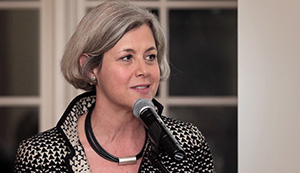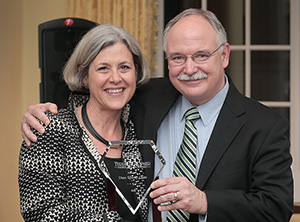A BCAN of hope in the darkness of cancer

In the dark world of cancer, there are those who shine like bright beacons of hope and guidance for many. Hoosier Cancer Research Network (HCRN) annually recognizes the role that spirited patient advocates and champions of oncological progress fill through the Terry Hoeppner Patient Advocacy Award, named in memory of beloved Indiana University football coach Terry Hoeppner, who died from brain cancer in 2007. The award honors individuals who exhibit Coach Hep’s spirit and determination to champion their cause.
HCRN recently honored Diane Zipursky Quale with the award in recognition of her long-standing support for cancer research and patient advocacy. President and co-founder of Bladder Cancer Advocacy Network (BCAN), Quale has been a champion of the bladder cancer community for more than 10 years. Her story of uncommon determination reflects the characteristic spirit of her late husband, attorney John Quale, and of Coach Hep, two men who “never quit.”
Diane was in private law practice until 1996 when she became Washington Counsel at National Broadcasting Company (NBC), and was later promoted to Vice President, Washington Law and Policy. “I always liked being a lawyer,” says Quale. “I always enjoyed being handed a problem and trying to analyze it and figure it out.”
In 2000, Diane and her husband John were handed an unexpected problem. “When John was diagnosed with bladder cancer, we had never heard of the disease,” Quale remembers. “We had no clue.” Yet, John inspired Diane with his unrelenting will to continue living life to its fullest. “At no time did John ever say ‘why me?’ He never felt sorry for himself. Through all of this he never let the cancer define him. He was an incredible man, and he set a wonderful example for our kids, for our friends, and for everybody he came in touch with. He was a real force, in a very good way.”

But as the Quales analyzed the situation and looked for help, they discovered a surprising void. “It was hard to get any information about bladder cancer, and we were shocked to find out how common it was and yet no one ever talked about it. We were really dismayed at the lack of treatment options.”
[Photo: Diane Zipursky Quale (left) and HCRN co-founder and IU Simon Cancer Center Director, Patrick Loehrer, MD.]
After a time of self-exploration, Quale made the decision to resign from her position at NBC in 2002, and she became an active participant in the cancer community. She recounts her experience being trained as a patient advocate at the NCI. “There were probably about 40 people and I was the only one there for bladder cancer, of course. So when I get up and talk about bladder cancer, they had never heard of bladder cancer. This is a group of cancer advocates – they’ve never heard of the disease.” That was her turning point. “I sort of said, ‘that’s it, I can’t stand this anymore. I can’t stand that this disease is so ignored.’ I said to John, what would you think if we started a patient advocacy organization, a non-profit for bladder cancer to raise awareness about this dis ease and try to find ways to fund more research? He was very supportive so he said, ‘You, Diane, can make this your work.’”
Diane emailed their doctor at Johns Hopkins, Mark Schoenberg, about her idea. “He wrote me back in about 20 minutes and said, ‘You have to do this and we must talk.’” One week later, Diane met with Dr. Schoenberg who encouraged her and John to attend the American Urological Association annual meeting, only two weeks away. “He said, ‘Let me pull a meeting together. You and John will come down and tell people what you want to do, and we will take it from there.’”
“As John and I are on the plane down to San Antonio, we said to each other, ‘Ok, if 5 people show up in addition to Mark, we are going to call this a success.’ We get there and we have our meeting – it was standing room only.” The response to the Quales’ presentation was overwhelming. “They said, ‘You have to do this. We need a patient voice for bladder cancer.’ We told them we wanted to raise awareness among the public. They told us we also need to raise awareness among the medical community. Mark asked for a show of hands of how many of them would be willing to serve on the scientific advisory board. Each and every one raised their hand. So on that day we had a scientific advisory board of 18 people. Quale recalls that defining moment. “I turned to my husband and said, ‘Well, I guess we really need to do this now.’”
In May 2005, the Quales launched BCAN. An active advisory board and bladder cancer “think tank” contributed to the creation of BCAN’s first patient handbook, called “Bladder Cancer Basics for the Newly Diagnosed.” Presently, there are more than 250,000 copies in print. In 2007, BCAN launched its on-line community, which now has more than 15,000 members.
John Quale, who survived multiple bouts with bladder cancer, witnessed the growth of the organization. He died of metastatic bladder cancer in June 2008.
BCAN began its annual walks for bladder cancer in 2011. “That became a big initiative for us, both as fundraising as well as raising awareness all around the US,” Quale notes. “It is a very grass-roots initiative.” BCAN began bestowing research awards in 2010, and in 2014, BCAN reached the 1-million-dollar mark in funding research.
Last year, BCAN partnered with HCRN to launch the Bladder Cancer Genomics Consortium, a collaborative effort between BCAN and major medical centers to complete a large-scale genomically driven bladder cancer study. The partnership was a natural choice for Quale and BCAN. “HCRN has a wonderful reputation in the cancer community, and specifically in the bladder cancer community. I knew they had experience in this area and knew a lot of our doctors. Our doctors spoke very highly of working with the team there.”
Diane was recently appointed to the Board of Scientific Advisors of the National Cancer Institute (NCI). She has served as the patient advocate representative on the Bladder Cancer Task Force at the NCI since 2010. She serves on the External Advisory Board of the Johns Hopkins Greenberg Bladder Cancer Institute. Diane is an Associate Editor of the new international journal, Bladder Cancer. In addition, Diane is a member of C-Change, a national non-profit organization of leaders in the cancer community, working on prevention, early detection, treatment and quality of life issues.
With her acceptance of the Terry Hoeppner Patient Advocacy Award, Diane joind the company of past honorees: Danny Danielson, Mary Lou Smith, Elda Railey, Tom Sibert, Janie Gordon, Nasir Ghiaseddin, and Ted Stansbury. “I am extremely grateful. It is just a great honor to have my work and BCAN’s work recognized in this way. Coach Hoeppner and his attitude and the impact he had is really incredibly admirable, and so I am truly honored to receive this award.”
Quale’s determined spirit was sparked by unexpected trials in her own life. Now, her “never quit” attitude as a champion of cancer patients and her many contributions to oncological progress shine like beacons of hope for those facing what the Quales faced years ago.
“It is never about one person. It is really about a community, and that is what we have done for bladder cancer — we’ve created this wonderful community that has a voice. Advancing research and finding a cure is key, but equally important is giving so that no one ever feels they are alone, and that people have the support they need to go through this experience with cancer. I am incredibly proud of our community, and it has been a community effort these past 10 years.”
About Hoosier Cancer Research Network:
Hoosier Cancer Research Network (formerly known as Hoosier Oncology Group) conducts innovative cancer research in collaboration with academic and community physicians and scientists across the United States. The organization provides comprehensive clinical trial management and support, from conception through publication. Created in 1984 as a program of the Walther Cancer Institute, Hoosier Cancer Research Network became an independent nonprofit clinical research organization in 2007. Since its founding, Hoosier Cancer Research Network has initiated more than 150 trials in a variety of cancer types and supportive care, resulting in more than 300 publications. More than 4,600 subjects have participated in Hoosier Cancer Research Network clinical trials.

Facebook
Hoosier Cancer Research Network on Facebook
Linked In
You Tube
Twitter